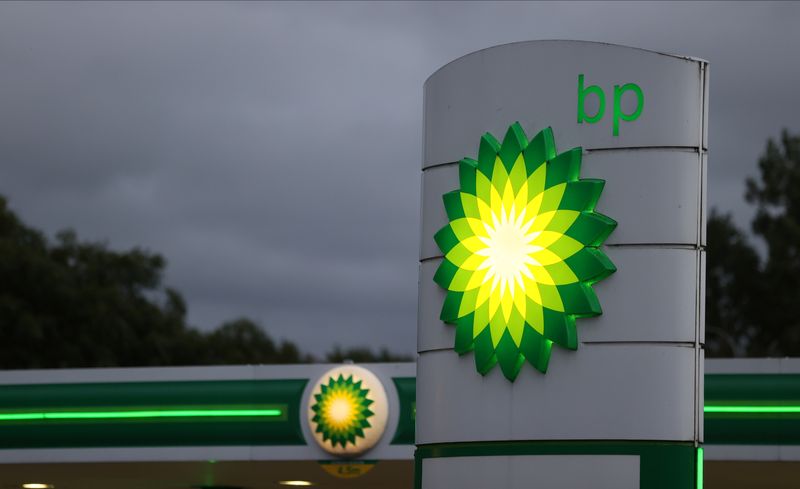(Corrects to read 'deputy head of' (not 'head of'), in paragraph 12)
By Ron Bousso
LONDON (Reuters) - BP (NYSE:BP) softened the language on its pledge to cut its 2030 oil and gas output in an effort to reassure investors over its energy transition strategy and narrow a gaping value gap with rivals.
CEO Murray Auchincloss has in recent months pivoted the London-based firm's strategy to focus heavily on returns. He has been less emphatic than his predecessor Bernard Looney on BP's shift towards renewables and low-carbon energy.
BP's shares today lag rivals Shell (LON:SHEL), TotalEnergies (EPA:TTEF), Exxon Mobil (NYSE:XOM) and Chevron (NYSE:CVX), based on a number of key metrics, reflecting concerns BP is not investing in the most profitable segments of its business, primarily oil and gas.
Auchincloss has not reversed a flagship target Looney announced in 2020, before watering it down in 2023, for BP to reduce oil and gas output by around 25% between 2019 and 2030 to 2 million barrels of oil equivalent per day (boed). BP is the only major oil company to have reduction targets, and the pledge has concerned some investors.
Speaking to Reuters on Tuesday after BP announced $2.7 billion in first quarter profits, Auchincloss said BP may overshoot or undershoot the 2030 target.
"Two million (boed) is a decent number to stick by right now. Could it be higher? Yes. Could it be lower? Yes."
PRAGMATIC APPROACH
Auchincloss, who took office in January following Looney's shock resignation last September, has said he would take a pragmatic approach.
BP has over 30 projects across its businesses that it would need to decide whether to proceed with in coming years, Auchincloss said.
"And as we make those decisions on a returns-based approach, that will help inform what we think our production will be in 2030, but I am focused on returns and cash flow, not volume," Auchincloss said.
In February, he said he expected BP's output to grow by 2% to 3% through 2027.
Earlier this year, Shell CEO Wael Sawan also watered down the company's emission reduction targets, citing expectations for strong gas demand and uncertainty about the energy transition as he also seeks to boost Shell's shares.
Biraj Borkhataria, deputy head of European research at RBC Capital Markets, said he expected BP to increase its spending on oil and gas production, known as upstream.
"BP highlighted they were focusing on returns, and therefore I would expect the next iteration of the capital allocation strategy to incorporate higher upstream capex (capital expenditure), and a lower allocation to certain aspects of its transition growth engines."

"All in all, this should translate to higher upstream volumes than the 2 million boed target in 2030," Borkhataria said.
(This story has been corrected to say 'deputy head of, 'not 'head of,' in paragraph 12)